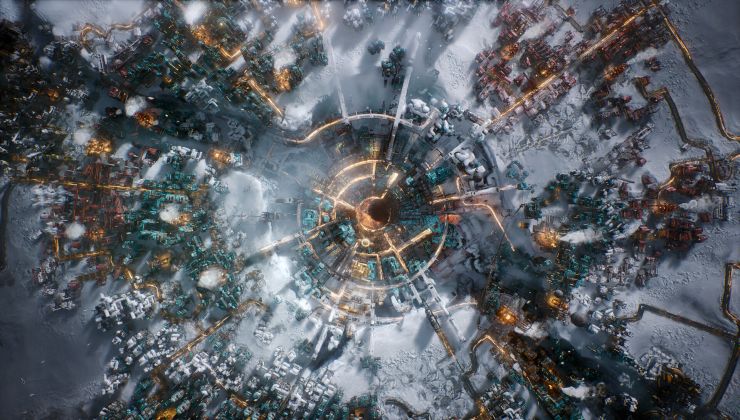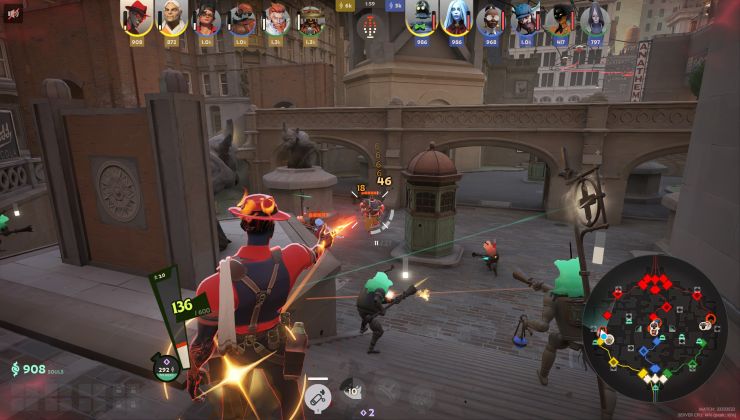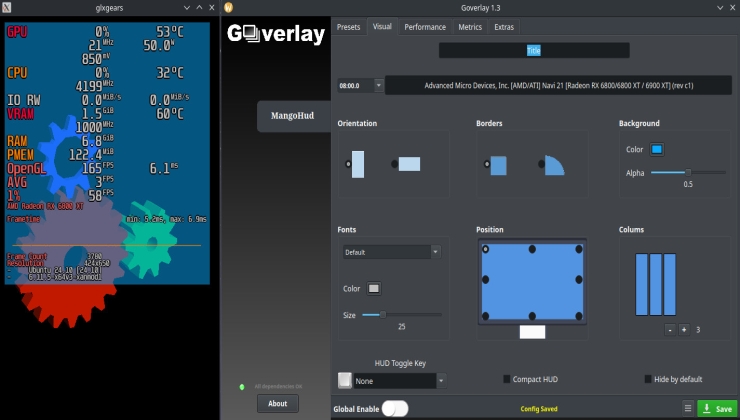Valve have put out their usual monthly Hardware & Software Survey and it's looking pretty great for Linux overall. April 2022 showed a big boost to Linux gamers. After a few months of dipping down, it seems to have rocketed back up to be at the second-highest point it's been in years with 1.14%.
You can see how it has changed over the last few years on our Steam Tracker, with the current posted below. The previous peak being November 2021 at 1.16%, the previous second highest being October 2021 at 1.13%.
Going by the main combined numbers from Steam, these are the current most popular Linux distributions:
- Ubuntu 20.04.4 LTS 64 bit 0.16% +0.03%
- "Arch Linux" 64 bit 0.14% +0.02%
- "Manjaro Linux" 64 bit 0.13% +0.01%
- Linux Mint 20.3 64 bit 0.07% 0.00%
- Ubuntu 21.10 64 bit 0.06% -0.01%
With the Steam Deck now shipping that uses SteamOS 3 Linux, it's perhaps not a big surprise to see a lot more interest in Linux Gaming overall now. Currently though, the Steam Survey is not included on the Steam Deck in Gaming Mode and only in Desktop Mode with the main Steam Client loaded so these numbers probably don't represent many Steam Deck users at all.
Thanks though to Proton and the Steam Deck, perhaps this is the start of a small shift over to Linux — one can hope but too early to tell anything really.
Like plenty of people use Windows on their desktop, but switch over to Linux when they use their Steam Deck. How does that count?
Thanks though to Protonfor killing native linux games development
Proton hasn't killed that. Natives were dying before that... and Valve promotes natives for the long term.
No, really, get over it. Linux game development was dying anyway. With Steam Deck, which could not exist without Proton-or-equivalent, we could see enough market share for Linux game development to rise again. Without it we were on a slow train to nowhere.Thanks though to Protonfor killing native linux games development
Yeah, I keep seeing people say that Proton is killing native Linux development (or guaranteed to be the death of native Linux games, or already has been/is), then I see on a fairly regular basis native Linux builds of various new (and old) games released. In addition to those native Linux games, I also see more games I've been told will never ever in a billion years run on Linux running on Linux (thanks to Proton).There is definitely a market segment that's been completely evaporated by the existence of Proton: third-party ports. Your Tomb Raiders, your Life Is Stranges, your Civilizations, your Borderlands. If you're after an out-house after-the-fact means of making your existing Windows game work on Linux why would you pay for someone to do it when Valve will do it for free? The fact is, though, that the lack of growth in the Linux gaming market since the introduction of the Steam Machines meant that that segment was drying up anyway before the introduction of Proton.
I highly doubt that Proton's gonna be the death of native Linux games, but it sure does give us all access to a shit-ton of games we'd not be able to play otherwise, and gives publishers and developers a dead-simple way to support selling their games to a platform that many such publishers simply don't understand well enough to give us a native Linux build even if they wanted to. I'm thankful for all the work Valve's put into the WINE project, even if it is totally self-serving and profit-driven. An "everybody wins" scenario still means I win, even if Valve wins also.
Developers that make a Linux build themselves, because they appreciate the additional insight when bug hunting, because they use Linux themselves, because they're using multiplatform tooling, will continue to do so because it makes sense, regardless of the existence of Proton.
However, there's another segment: new developers, or seasoned developers starting a new project. They could develop their next project as multiplatform from the start, and use cross-platform tooling, and Vulkan & SDL rather than DirectX, and it would benefit them and us if they did so: more users of the software means faster bug finding, faster and more innovative development and improvement, actual testing and support for Linux gaming customers, and a wider recognition that Linux is a valid gaming platform. When those developers are looking around to see how they should proceed, and what the benefits and costs are, the "just use Proton!" mob are going out of their way to discourage developers from even trying to do multiplatform in a way that includes Linux. That is what harms the Linux gaming ecosystem rather than Proton itself.
In principle the growth of Linux marketshare could provide positive pressure for proper multiplatform development at a level that outpaces the negative pressure from people telling developers not to bother, but it's a long way from being a given.
I know market share is a meaningful information but has anyone been keeping tab on absolute linux user number estimates ?
Because Steam userbase is constantly growing so a market share growth within a absolute numbers growth is kinda cool actually.
From Liam's handy-dandy Steam Tracker page:
For an estimation of the total number of Linux users on Steam, Valve reported they had 132 million "monthly active users" in March 2022 (source).
Using the latest months recorded share (Apr-2022 - 1.14%): 1,504,800 estimated "monthly active users" for Linux+Steam.
To be clear, that is not the total, that is monthly active.
But I do keep in mind "being this or that OS user" does not necessarily mean "there have been sales for this or that OS" or "people equally play that amount of time regardless of their system".Some developers talk about sales per platform, but most don't. Of the ones that have gone public with their sales data, those that don't market to Linux users specifically have sales proportions in line with the Linux marketshare, or sometimes a bit lower; those that do market to Linux users specifically tend to have sales proportions higher than that, sometimes significantly so. And in both cases those are generally given as unit sales rather than revenue.
I mean there are tons of statistical biases which prevents us to ultimately declare whether Linux is doing well or not but with some hindsight it's looking good.
I'm just curious how they handle people using multiple OSs.It's a hardware survey rather than a user survey. If you have two machines (including one machine that runs two OSes) then they both get counted.
Like plenty of people use Windows on their desktop, but switch over to Linux when they use their Steam Deck. How does that count?
Thanks though to Protonfor killing native linux games development
This kind of sounds like just whining because you didn't get your way. I can understand someone who has strong free software principles and doesn't want to play proprietary games. I can even understand people who only want DRM-free games. But what is the actual ideology of someone who doesn't like game support on Linux unless it's native? You can't claim you're doing it to advocate for free software. Wine, Proton, DXVK, etc. are all free and open source. You're kind of spitting all over their work and not actually contributing anything other than a complaint about not getting things your way.
I'm not trying to be harsh, but I just really want to understand how being mad at Valve and the FOSS community for making more games work on Linux is productive. Would you rather go back to having most games not work on Linux?
wow if this keeps going on, in a couple of years we will take on MacOS!Yeah, I noticed that when another article on this brought my attention to it: MacOS is down to 2.55% this month. It was higher in the past, wasn't it, and I'm not just misremembering? I've had in my head for a while that it was "about 5%".
Blame Gabe for Microsoft's continued dominance in the PC gaming space, he helped port Doom from DOS to Windows and practically ensured M$ would set the standards going forward.Was Linux a worthy and reliable alternative to Windows back then? Were open standarts ie. OpenGL useful?
Thanks though to Protonfor killing native linux games development
I get your sentiment, but the hard truth is unfortunately that the AAA ports where already mostly dead or at least not sustainable in the long term. See this blog post from an insider https://mdiluz.micro.blog/2021/07/19/native-linux-ports.html and also this older blog https://www.gamingonlinux.com/2020/05/linux-gaming-ticking-clock/ from the same author.
Last edited by jens on 3 May 2022 at 7:09 pm UTC
How can people commenting here and even this site owner not realize that a platform without developers is destined to die? The ability to run other OSes applications is not enough to make a platform survive, it never was: look at OS/2, or if you prefer a story where Microsoft loses, Windows Phone: nobody was developing for it, Microsoft even had a project to allow WP to run Android apps (it was called Astoria). They realized the hopelessness of it and they killed it, preferring to abandon that market instead. Developers make a platform's fortunes, and Proton is shouting to developers "keep developing for windows".
Yes, a platform without developers dies. That's Linux gaming alright! You either have:
- Linux gaming dies out, or
- it lives with proton and maybe if it survives you have a hope of asking devs to target it
To use your own example, WP without the Android emulator was a *definite* failure. WP with the Android emulator was a *maybe* succeeds (which, thankfully didn't).
So we need proton if we want to have a chance of existing.
Last edited by ShabbyX on 4 May 2022 at 12:00 pm UTC
HDevelopers make a platform's fortunes, and Proton is shouting to developers "keep developing for windows".I think it's more Linux's <2% market share that is shouting to developers to invest their finite time in ~98% of their potential customer base. Once Linux market share rises to a "large-enough" amount (and the number of games still coming out for Window + MacOS suggests that number doesn't actually have to be all that huge, but is larger than ~1%), developers will naturally start investing in it. But the previous decade or two have definitely shown that people aren't going to adopt Linux in droves if they can only play <1/10th of the games available on Windows. I didn't come up with the analogy, but Proton is Valve's Trojan Horse against Windows: show people that yes, they can switch to Linux without giving up most of their already-purchased game libraries, and eventually some will start to switch (helped by the Deck giving people a taste of Linux in a gaming context). We're still in the transition period (which might yet prove to be years or even decades long) where the Linux market share is quietly rising while there's still no sign of increasing native ports (yet), but the early stages of spring often still look a lot like winter.
Last edited by Philadelphus on 4 May 2022 at 4:57 am UTC
How can people commenting here and even this site owner not realize that a platform without developers is destined to die? The ability to run other OSes applications is not enough to make a platform survive, it never was: look at OS/2, or if you prefer a story where Microsoft loses, Windows Phone: nobody was developing for it, Microsoft even had a project to allow WP to run Android apps (it was called Astoria). They realized the hopelessness of it and they killed it, preferring to abandon that market instead. Developers make a platform's fortunes, and Proton is shouting to developers "keep developing for windows".
Developers that want their games to work well with Proton have to engage with Linux at some level, especially with the Steam Deck. I had 2 different Windows phones back in the day. Everything about them was great...except for the lack of android apps. I am sure they would have had far more success if on launch they had a way to seamlessly run even the top 100 most popular Android apps. That's what MS promised btw, that within some amount of time right after launch, the top 100 most popular android apps would be fully supported on Windows phones. it never happened though.
Proton is already in a far FAR better place than that with the Steam Deck, and the sales numbers so far seem to indicate that.
People keep talking about Linux native gaming being "killed" by Proton, but the hard truth is Linux native gaming has never been alive. Unless you played a super specific set of games that were released as Linux native titles, you were screwed. Sorry, but Super Tux Kart and all the plethora of Quake/UT clones don't count as a thriving gaming community, and that's coming from somebody who enjoys and plays those games native on Linux.
Native Linux gaming has existed for 20+ years and there have never been a large number of devs/studios interested in creating games for it. I wish there were, and I think Proton is the only hope for that. It actually gets Linux gaming in the hands of people to see what all the fuss is about. It actually can start having streamers and content creators that are more in the general world of gaming instead of deep within Linux/FOSS communities.
Seeing that Linux is viable for high-end AAA gaming will attract more devs and studios, especially if over that next several years Linux gains a few more percent of the market share. Then the platform looks better and better for devs to spend their time on.
Meanwhile a game like Planetary Titan: Annihilation had a linux port go completely broken on linux for AMD GPUs because of a proprietary lib they used for desingning their UI in HTML, despite the lib being available officially for linux when adopted.
This to say:
1) yes, there is a noticeable difference between native linux games and using proton, but being better than proton is as much about
2) proton is complex and frail itself so it's nice to have but not a perfect solution... years of helping people out in the Steam for Linux discussion forum on steam have shown just how much fixing proton back to help can look hopeless for the unlucky, while others can have a flawless out-of-the-box experience... it's great to have, but it would be better to have it as plan B instead of all your plan
3) running well on proton in its early days was curiously tied to the same characteristics that made other games run well as a native linux game: using opensource crossplatform libs and standards... which is waaaaay easier if done from the ground up when you first start developing a game than on after-the-fact porting (which also frequently skips that movement and entails using bundled translation layers akin to dxvk, but frequently worse... like Valve's horrible toGL or PT:A's deathtrap of a proprietary UI lib)
to me that means even if some devs only start to care about making their already released windows games run over proton instead of making them run natively on linux, there is a small step forward for them in acknowledging the platform and in possibly acknowledging the importance of crossplatform opensource libs...
then there are devs who will go for native ports after-the-fact and get burned by their original choices of proprietary libs and standards while porting (in-house or hiring external porting companies)...
some of those have taken from this experience that linux is horrible and not worth it and they didn't give up on much then because linux share was <1%, but if it's >5% it will sting to loose it due to lib XYZ that didn't behave well enough, and next game they make might start differently...
and some already develop their games as cross-platform but didn't care much for opensource libs because they only had proprietary-first ecossystems in their radar like Win10 + Xbox One series + PS4/5 + Switch + Mac, but with linux appearing on their radar they might find it now makes sense to use the opensource stuff that covers more of those platforms at once
Steam Deck users only get invited to participate in the hardware survey while in Desktop Mode (with the Steam client running); most will spend all their time in Gaming Mode. Meaning a lot of Deck owners won't even get a chance to be part of the survey - source.I mean, their source is literally me and this article.










 4 May 2022
4 May 2022

 How to set, change and reset your SteamOS / Steam Deck desktop sudo password
How to set, change and reset your SteamOS / Steam Deck desktop sudo password How to set up Decky Loader on Steam Deck / SteamOS for easy plugins
How to set up Decky Loader on Steam Deck / SteamOS for easy plugins
See more from me